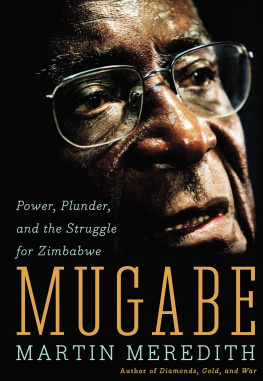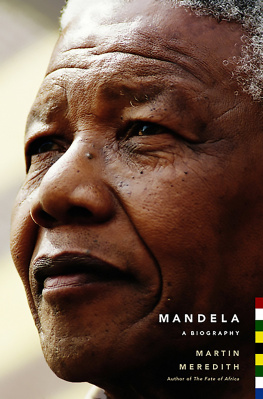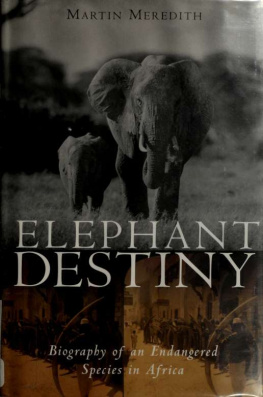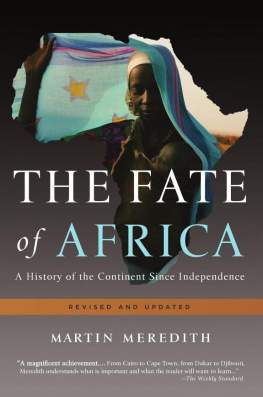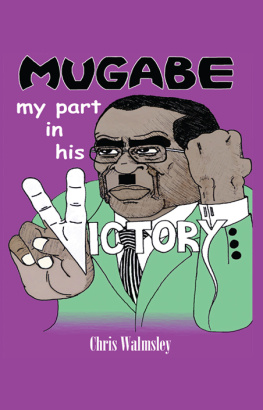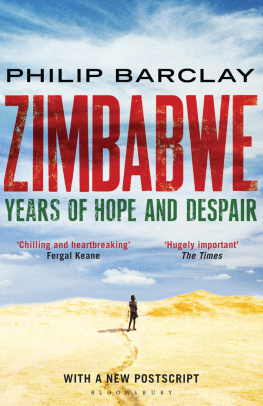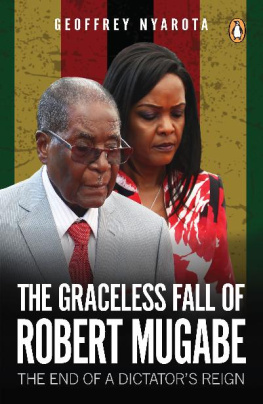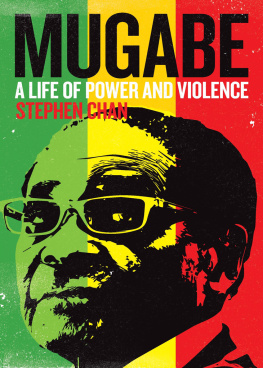Martin Meredith - Mugabe: Power, Plunder, and the Struggle for Zimbabwes Future
Here you can read online Martin Meredith - Mugabe: Power, Plunder, and the Struggle for Zimbabwes Future full text of the book (entire story) in english for free. Download pdf and epub, get meaning, cover and reviews about this ebook. year: 2009, publisher: PublicAffairs, genre: Politics. Description of the work, (preface) as well as reviews are available. Best literature library LitArk.com created for fans of good reading and offers a wide selection of genres:
Romance novel
Science fiction
Adventure
Detective
Science
History
Home and family
Prose
Art
Politics
Computer
Non-fiction
Religion
Business
Children
Humor
Choose a favorite category and find really read worthwhile books. Enjoy immersion in the world of imagination, feel the emotions of the characters or learn something new for yourself, make an fascinating discovery.
- Book:Mugabe: Power, Plunder, and the Struggle for Zimbabwes Future
- Author:
- Publisher:PublicAffairs
- Genre:
- Year:2009
- Rating:5 / 5
- Favourites:Add to favourites
- Your mark:
- 100
- 1
- 2
- 3
- 4
- 5
Mugabe: Power, Plunder, and the Struggle for Zimbabwes Future: summary, description and annotation
We offer to read an annotation, description, summary or preface (depends on what the author of the book "Mugabe: Power, Plunder, and the Struggle for Zimbabwes Future" wrote himself). If you haven't found the necessary information about the book — write in the comments, we will try to find it.
Mugabe: Power, Plunder, and the Struggle for Zimbabwes Future — read online for free the complete book (whole text) full work
Below is the text of the book, divided by pages. System saving the place of the last page read, allows you to conveniently read the book "Mugabe: Power, Plunder, and the Struggle for Zimbabwes Future" online for free, without having to search again every time where you left off. Put a bookmark, and you can go to the page where you finished reading at any time.
Font size:
Interval:
Bookmark:

This book made available by the Internet Archive.





Our votes must go together with our guns. After all, any vote we shall have, shall have been the product of the gun. The gun which produces the vote should remain its security officerits guarantor. The people's votes and the people's guns are always inseparable twins.
ROBERT MUGABE, I976
.

\
.../*!

Atlantic Ocean
Indiaq Ocearx^
Miles
A. Karl /J. Kemp, 2
THE PRIEST AND THE PRESIDENT
From the window of his book-lined study, Father Dieter Scholz gazed out at the hills surrounding Chishawasha Mission as he reflected on the character and career of Robert Mugabe, the aging president of Zimbabwe. They had first met at a secret gathering in Salisbury in December 1974 a few days after Mugabe had been released from eleven years' imprisonment during a cease-fire in the guerrilla war against white rule in Rhodesia, as Zimbabwe was then called. Father Scholz, a Jesuit, had been one of the few white priests to support the African nationalist cause. As a member of the Catholic Justice and Peace Commission, he had played a leading role in investigating wartime atrocities by the Rhodesian security forces. Together with a small band of Catholic colleagues, he was regarded by Ian Smith's regime as "an enemy of the state." Smith had seized independence from Britain in 1965, determined to halt the tide of black nationalism sweeping through Africa that had led Britain to hand over its other colonies to African rulers. In the civil war that subsequently broke out in Rhodesia in 1972, Smith acted ruthlessly against his opponents, both black and white. Father Scholz was kept under constant surveillance. With a
new cease-fire in place, he and his colleagues had gone to the meeting with Mugabe, in a college building in the city centre, to gain a first-hand account of the negotiations that had led to Mugabe's release. "He was quiet spoken and articulate," recalled Father Scholz in 2001. "There was no rancour."
Mugabe told the gathering that during the previous month in Que Que prison he had been in the process of writing a Latin examination for a law degree when an African envoy arrived asking him and other senior members of the banned Zimbabwe African National Union (Zanu) to attend a summit meeting of African leaders in neighbouring Zambia that was intended to pave the way to negotiations for a Rhodesian settlement. He was told the plan was backed by Tanzania's Julius Nyerere, Zambia's Kenneth Kaunda, Mozambique's Samora Machel, and Botswana's Seretse Khama, all of whom had hitherto supported the war effort, allowing guerrillas to use their territories to establish rear bases and supply lines. Also involved in the plan was the South African prime minister, John Vorster, who had provided the Rhodesian security forces with crucial support and who was prepared to lean heavily on Smith to get him to cooperate. As part of the plan, Mugabe was told, the Rhodesian authorities had agreed to his temporary release from prison; a senior white official subsequendy visited him to promise that the government would pay for any costs resulting from an interruption to his law examinations.
But Mugabe was hostile to any idea of negotiations. His years of imprisonment had only hardened his resolve to pursue revolution in Rhodesia. Alone among the nationalist leaders, he saw no reason to seek a compromise with Rhodesia's white rulers that would leave the structure of white society largely intact and thwart his hopes of achieving an egalitarian people's state. Whereas other imprisoned nationalists, such as his main rival, Joshua Nkomo, the leader of the Zimbabwe African People's Union (Zapu), were willing to come to terms with Ian Smith, Mugabe regarded armed struggle as an essential part of the process of establishing a new society.
Mugabe's first reaction to the proposal to attend the summit meeting in Lusaka was to turn it down. "We Zanu leaders felt that we could not entertain talks at this stage, that it was too early," he told the Catholic group. Even when the African envoy returned to Que Que prison two days later with a written invitation signed by Nyerere, Kaunda, Machel, and Khama, Mugabe was still reluctant to go. "We were very angry because we thought that the heads of state were selling us out," he explained. Only under duress had he finally agreed to travel to Zambia for a preliminary meeting. "The four heads of state said we could prosecute the war to the end, but if we had a chance to achieve the same aim without bloodshed, we should do so." They also wanted Zanu and Zapu to bury their differences and form a united front for the negotiations. But Mugabe remained recalcitrant. Soon afterwards he returned to his prison cell.
When the summit meeting eventually took place in Lusaka, Zambia, in December 1974, it was a fractious event. The African presidents were infuriated by the continuing divisions between Zanu and Zapu. "Nyerere attacked both Zanu and Zapu," Mugabe reported. "He scolded us and then Kaunda spoke and attacked us still more viciously, calling us treacherous, criminal, selfish and not taking the interests of our people to heart. If we did not comply, he would no longer entertain our military presence in Zambia." Machel, he said, had made similar threats about Mozambique's support.
Faced with those threats, Mugabe ostensibly agreed to form a united front and to accept the plan for negotiation, but he had no intention of adhering to it. "We all had plans for self-preservation," he admitted to the Catholic group.
Upon his release from prison, Mugabe, together with a few trusted colleagues, set about secretly organising recruits for Zanu's guerrilla army, Zanla, based in neighbouring Mozambique. Mugabe was assigned the Salisbury district. He was a frequent visitor to Sil-veira House, a training centre for black leaders that Jesuit priests had established on land belonging to Chishawasha Mission, fifteen
miles east of Salisbury. It was one of the few places in Rhodesia where black politicians and church personnel met regularly to discuss ideas for a new social order. Mugabe's two sisters, Sabina and Bridgette, were employed there to work on development programmes for women. Mugabe was given an office and a telephone there and he lectured on Christianity and socialism.
Silveira House was well known to Smith's security police as a hotbed of dissent and was constantly watched. On days when the presence of the security police was more evident than usual, Father John Dove, a former British army officer who had founded the centre, would discreetly inform the staff, "today we are sailing close to the wind."
Font size:
Interval:
Bookmark:
Similar books «Mugabe: Power, Plunder, and the Struggle for Zimbabwes Future»
Look at similar books to Mugabe: Power, Plunder, and the Struggle for Zimbabwes Future. We have selected literature similar in name and meaning in the hope of providing readers with more options to find new, interesting, not yet read works.
Discussion, reviews of the book Mugabe: Power, Plunder, and the Struggle for Zimbabwes Future and just readers' own opinions. Leave your comments, write what you think about the work, its meaning or the main characters. Specify what exactly you liked and what you didn't like, and why you think so.

